Brandon Blackwood on normalizing Black luxury

Brandon Blackwood stars on In The Know’s digital cover for September 2021. Read below for his accompanying feature article. You can find out more about the Brandon Blackwood bags featured in this month’s cover shoot here and shop the fashion looks here.
It’s 4 p.m. on a Tuesday in August, and designer Brandon Blackwood is walking around an opulent New York City apartment in a Prada jumpsuit, adjusting his diamond-encrusted Cartier watch. The September cover star has spent the day with photographer Shaniqwa Jarvis lounging in a fluffy bathrobe and sipping from a tower of champagne for In The Know’s inaugural Luxury issue. His hands are adorned in rings and custom nails by his go-to nail tech, Melissa of @finesseyourclaws, who he met on Instagram by sliding into her DMs.
The 29-year-old is not only breaking all the rules of what it means to be a serious fashion designer, but he is also totally self-made. He started his eponymous brand seven years ago after saving up money working in retail. While he has had some major viral moments with some of the biggest celebrities, from Halle Berry to Kim Kardashian, his cult following as a designer in the luxury fashion space is all due to his ability to grow and sustain a community of Gen Z and Millennial children of the internet. Not only does he bring people together with unapologetic political commentary, but he co-creates his handbags with them.
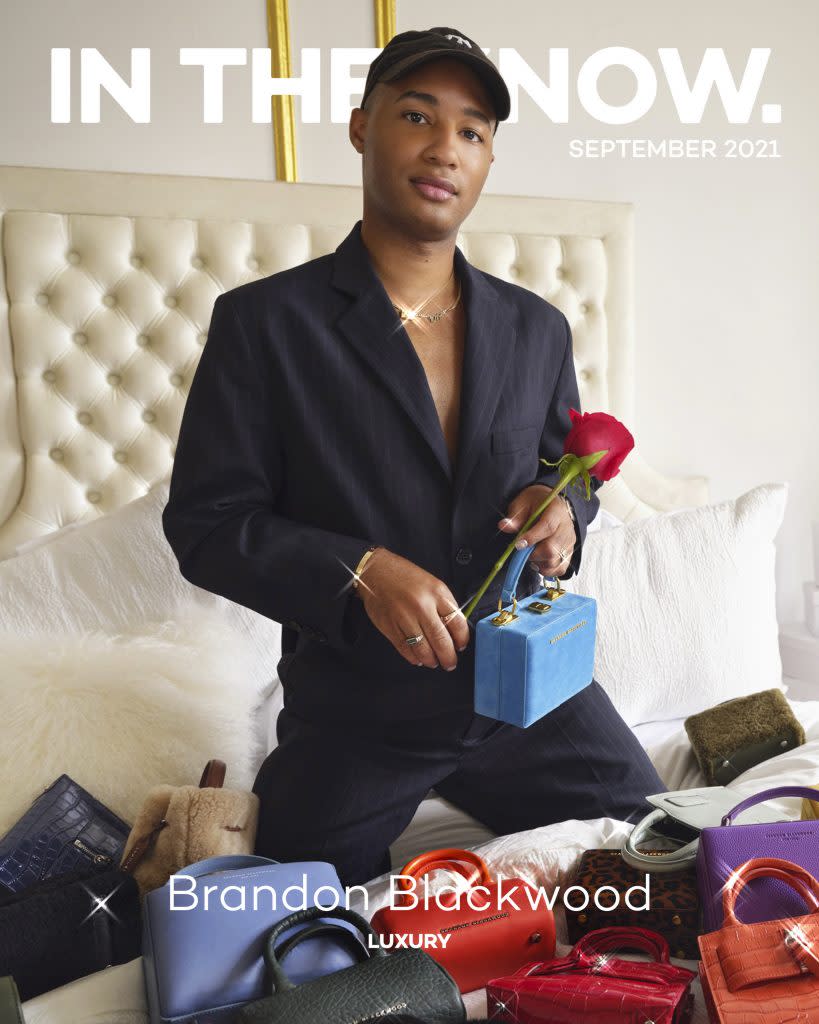
Photo by Shaniqwa Jarvis
“I call my followers my cousins,” he tells Elaine Welteroth. “I’m like, ‘Hey cousins, I’m trying to do this and this and this.’ And some of my best colorways, textures [and] things like that have been suggestions from my community. I used to post my swatches for the season before and be like, ‘Okay everyone, pick them out. Let’s figure it out.’”
In his first-ever cover interview, the designer opens up to Elaine Welteroth about why he discontinued his viral “End Systemic Racism” tote, normalizing Black luxury and how his remarkable success is different than he imagined.

Photo by Shaniqwa Jarvis
Elaine Welteroth: Well, first of all, congratulations! How does it feel to be a full-on cover guy, especially for the September issue?
Brandon Blackwood: It’s crazy. We got the call, and I was like, “Absolutely. Yes, let’s do it.” It’s really awesome. It’s my first [cover] … It’s very, very special. I’m really, really excited.
“I want the idea of Black luxury or Black-owned luxury to not be as much of a hot topic anymore. I want it to be more of a norm.”
Elaine: I love that so much. Is there anything about stepping into this new level of success that isn’t what you would have expected?
Brandon: When I wasn’t in this position, it seemed really glamorous and really awesome. All these meetings and calls, all these collections. It seemed really fun at first, but I feel like people don’t realize I get barely any sleep. I don’t really get that much time to hang out with people anymore — it really does consume your time.
I think, also, the larger your audience grows, the more you’re open to being criticized. And I’m a Libra; I am so sensitive about that type of stuff. So that’s something I had to learn to just accept. There’s always going to be someone who’s just not into me or into what I do, and I’ve learned to stop taking it personally.
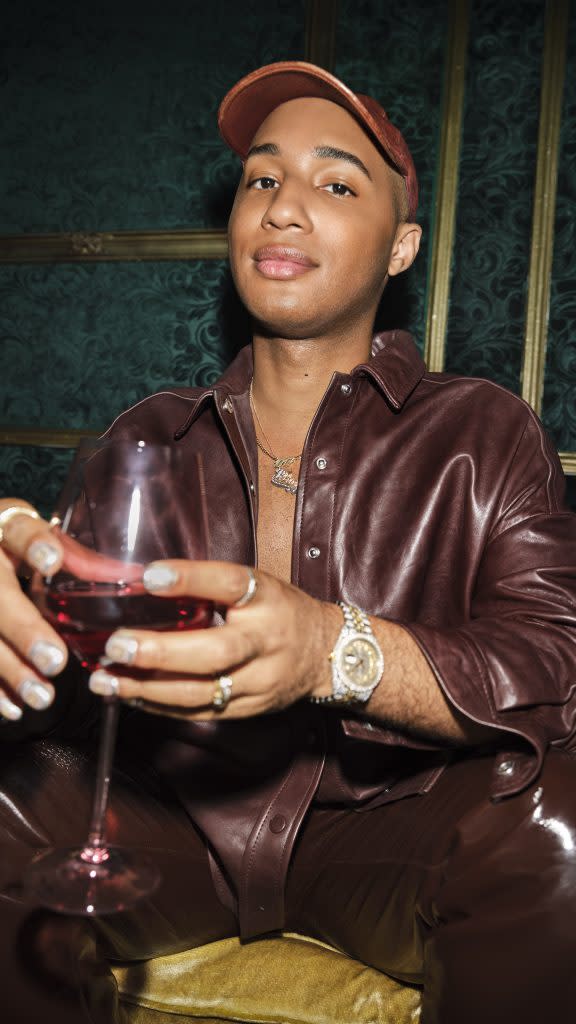
Photo by Shaniqwa Jarvis
Elaine: You grew up in a strict immigrant household that didn’t support you pursuing a fashion career, but I’ve read that you credit your success to being raised by a Jamaican woman. Tell me why you say that.
Brandon: I think after college, when I learned that I can do things myself and I was in control of my own life, that’s when I started doing my own thing. I think when everyone else couldn’t necessarily control me, that’s when they started supporting me.
My mom is probably the hardest working, most intense individual you’ll ever meet. She is prime Scorpio! Just a go-getter extraordinaire. I have seen her so many times make nothing into something; she’s like a jack of all trades. She went from working on Wall Street to law to going to a culinary school and opening a restaurant. Then, she was one of the few female contractors in New York City. She was building homes for all of these people, all throughout Brooklyn and Manhattan, building restaurants and stuff. I feel like having that as the source of what you’re seeing every day — you’ve got to take something from that.
Elaine: That gave me chills. Does Jamaican culture influence your work at all?
Brandon: I think Jamaicans as a whole are very loud and present and prideful people. The dancehall culture is just all color, so vibrant — I try to bring that into my work. My work is very colorful, very different. The shapes are safe and pretty classic but with a twist.
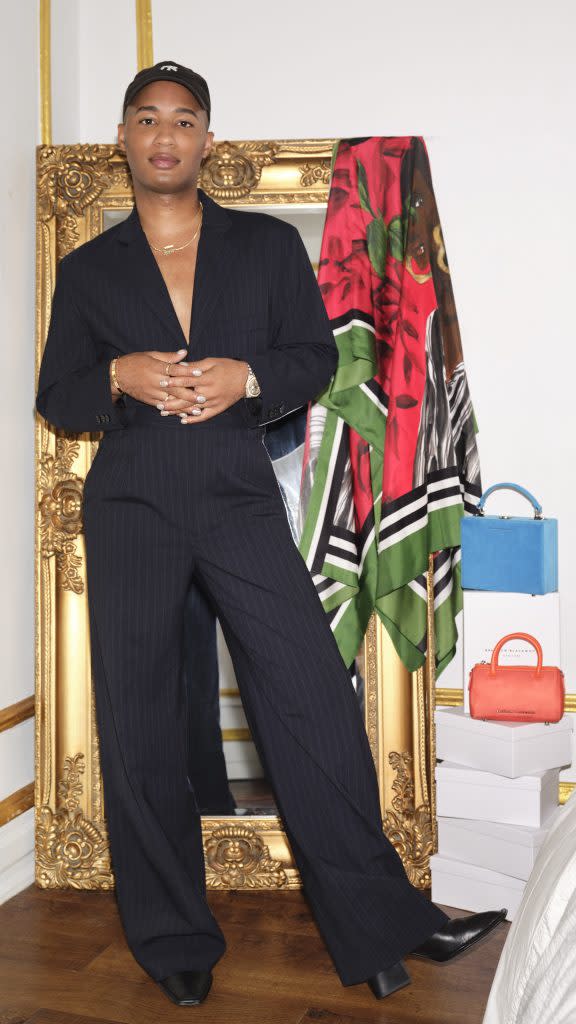
Photo by Shaniqwa Jarvis
Elaine: So, since you are the purveyor of Black luxury…
Brandon: [Giggles] Yeah, I am the purveyor of that.
Elaine: Listen, own it! Claim it, honey. It’s going to be on your cover! Tell me what your definition of luxury is and how that might be different from the conventional understanding of luxury that we were taught growing up.
Brandon: To me, luxury is many things. I think most people go to the very obvious definition of it, which is just over-the-top, almost to the point of excess, having everything and anything. But I think overall luxury, to me, it’s just comfort. To me, it’s just being cozy in a great sweater, great sneakers, whatever. Luxury, to me, is more of a feeling than the actual material thing.
“I just can’t fathom the idea of someone telling me what to do. I’m sorry it sounds horrible to say, but that will never happen.”
Growing up, personally, I didn’t have any real examples of Black-owned luxury brands. Whenever I thought of luxury, it was always a white person in a white ad by a white company; that was luxury to me. And, although they’re still great brands that I love even today, I think the idea of a Black person kind of taking up that space and having luxury be their narrative is very, very different and a little wild to people. That’s why we need the Kerbys and the Auroras and the Christopher John Rogers. And I think it’s really cool to see this movement of just Black people in luxury, making things happen, making things relevant. That’s what normalizing Black luxury to me is. It’s just taking up space within that market.
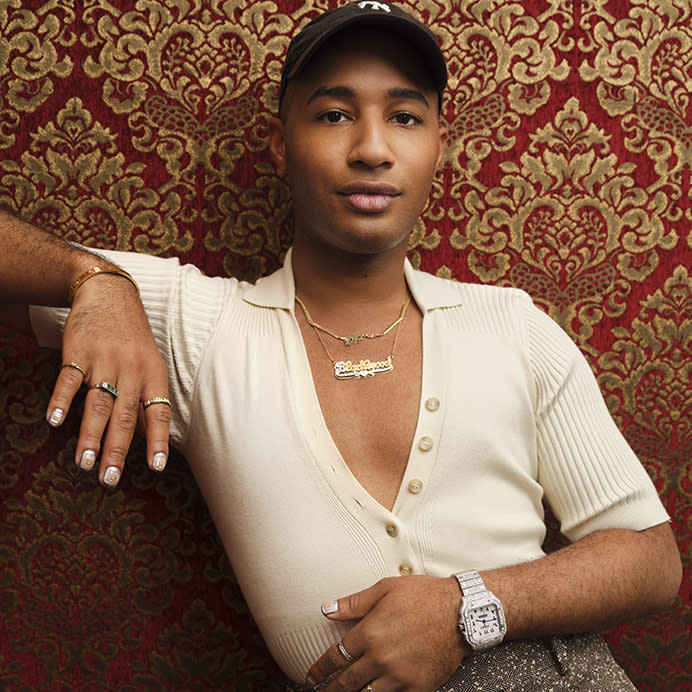
Photo by Shaniqwa Jarvis
Elaine: You’re a part of this new cohort, if you will, of Black designers who are redefining luxury and really changing the culture of fashion and the conversations coming out of this industry. Your aesthetics are distinct from one another, but you are a part of one community. I’m curious what it feels like to be a part of that community. Do you all lean on each other behind the scenes privately when no one else is looking?
Brandon: I would say there are three people who really come to mind. Raul [Lopez] from LUAR. Any question I have about production or about mixing materials, he’ll give me the straight and honest answer. He’s probably one of the few people that sees any of my samples or sketches or anything before they go into production. I trust him so much, and he’s always been there. 3:00 a.m., I can call him.
Then there’s Edvin [Thompson] from Theophilio — he’s a fellow Jamaican. Since day one, Edvin’s been almost like a brother to me, and he’s the one I can really lean on. And then Kerby [Jean-Raymond] too; I feel like Kerby is everyone’s kind of big brother. Kerby will make it a point to reach out and be like, “Do you need anything? Are you good? Tell me if you have any issues.” And he’s really helped steer me in the right direction. I could call him right now — I know he’ll pick up.
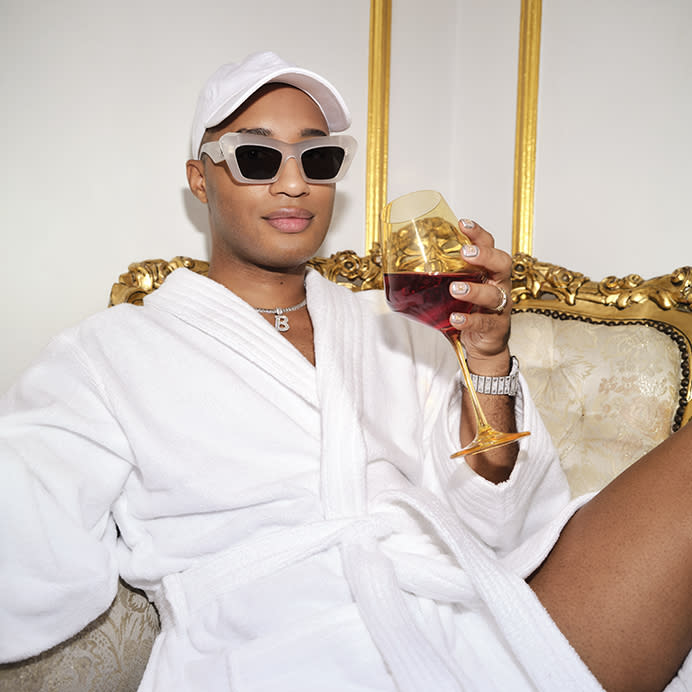
Elaine: How do you hope to see the luxury fashion world change in the next 10 years as a result of all of you infiltrating this space and changing it from the inside out?
Brandon: I honestly want to see permanent change. I want us to last the test of time. I want us to keep creating 10, 20 years down the line and still be relevant. I want the idea of Black luxury or Black-owned luxury to not be as much of a hot topic anymore. I want it to be more of a norm. It’s kind of insane that all these legacy houses in 2021, none of them are Black-owned. I would love to see that.
“It’s going to be Brandon Blackwood 2.0. We’re snatching wigs come October.”
Elaine: We’ve got to make it happen. How important is ownership in this new definition of Black luxury?
Brandon: I think ownership is so key because for so long, we weren’t able to do this and to do it at this rate. Why would I give this to a white person now, when it’s majority Black-owned and with majority Black customers — why would I give that away?
I own everything. I am not interested in anyone else having a part of the brand. If I have to grow slower because of it, fine. But no, I just can’t fathom the idea of someone telling me what to do. I’m sorry, it sounds horrible to say, but that will never happen. My mom is a Jamaican businesswoman. From birth, she was like, “Whatever you do, do it yourself.” No shade to anyone who has an investor — do you! — but I can’t. We Black over here, boo.
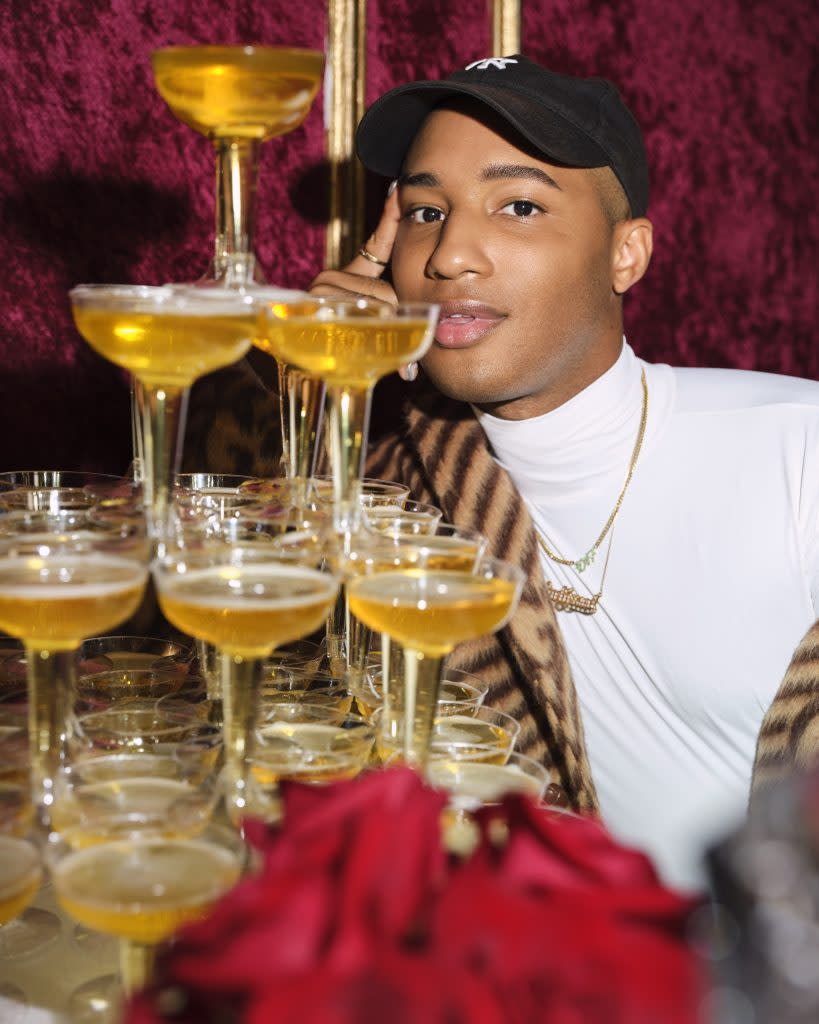
Photo by Shaniqwa Jarvis
Elaine: It’s inspiring to hear someone who is as young as you are in a position to maintain and prioritize those values as you grow. That’s dope. So, we all know that when you put out the “End Systemic Racism” bag, it was a really pivotal turning point in your career and a defining moment for your brand. And we also know that you just recently discontinued it, despite it being extremely popular. Can you talk about your reason behind discontinuing it?
Brandon: It became a thing where it got so popular so quickly; I didn’t expect that at all. And then I feel like once it started getting to a point where people were reselling them, and they were selling out so quickly, and it was a lot of people who I don’t think really cared about the message but just wanted to be seen in one — that kind of felt really gross.
The fact that it’s $600 on StockX and Poshmark is wild. Like, it’s a canvas tote! It had to go. I had to stop it. We’re going to continue just donating the sales from our standard collections to different organizations.

Photo by Shaniqwa Jarvis
Elaine: I know you said you hardly get any sleep these days — what is your philosophy on rest?
Brandon: My philosophy is not what I practice, but I always say treat your body and your mental [health] the same way you treat your bank account. If your bank account is low, you’re not overspending, you’re not overcharging — [that’s] the same way [you should treat] your mental health. If it’s low, save it up, make it grow, and then attack what you need to attack.
Elaine: That’s a sermon! A whole entire word. When I randomly caught your IG Live the other night at, like, midnight, when I should have been sleeping, you alluded that you have some news coming up this fall. So I had to ask you what you were hinting at.
Brandon: I’m making something that’s not bags, and I’m very excited. It’s been a long time in the works, and I can’t wait to present it. And how I’m presenting it is going to be the craziest thing I’ve ever done. It’s going to be Brandon Blackwood 2.0. I think a lot of people, if they don’t take me seriously already, after this, it’s going to be next level. We’re snatching wigs come October.
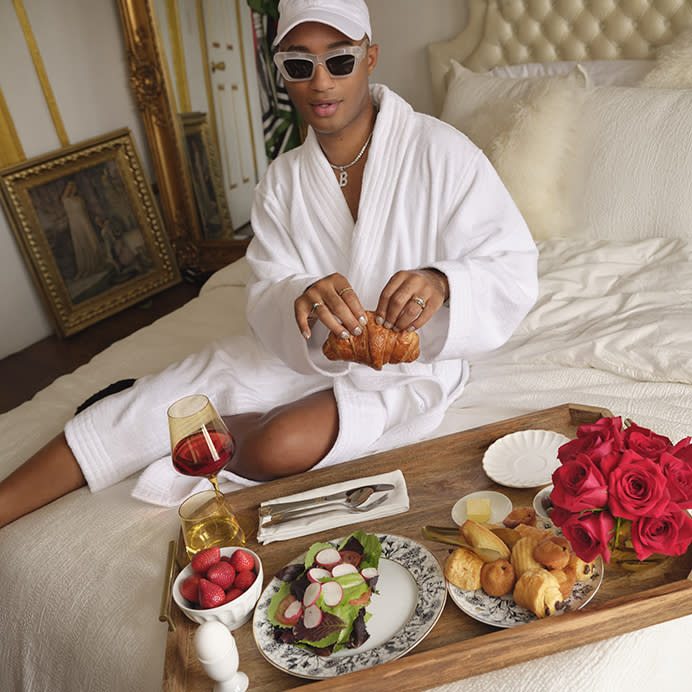
Our team is dedicated to finding and telling you more about the products and deals we love. If you love them too and decide to purchase through the links below, we may receive a commission. Pricing and availability are subject to change.
Go behind the scenes of In The Know’s September digital cover shoot with Brandon Blackwood below:
If you enjoyed our September cover story with Brandon Blackwood, check out In The Know’s August feature with Storm Reid!
The post Brandon Blackwood on normalizing Black luxury appeared first on In The Know.